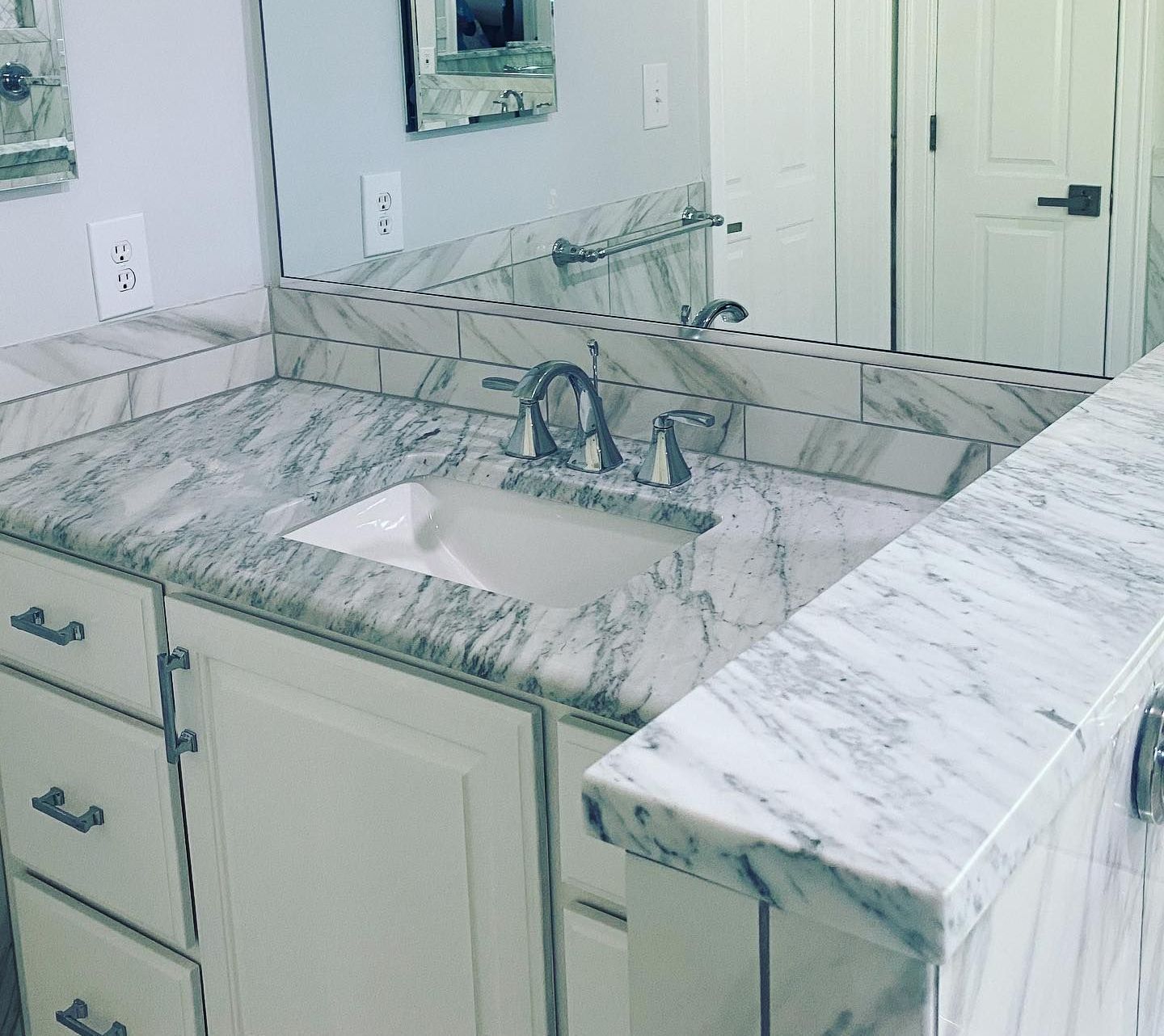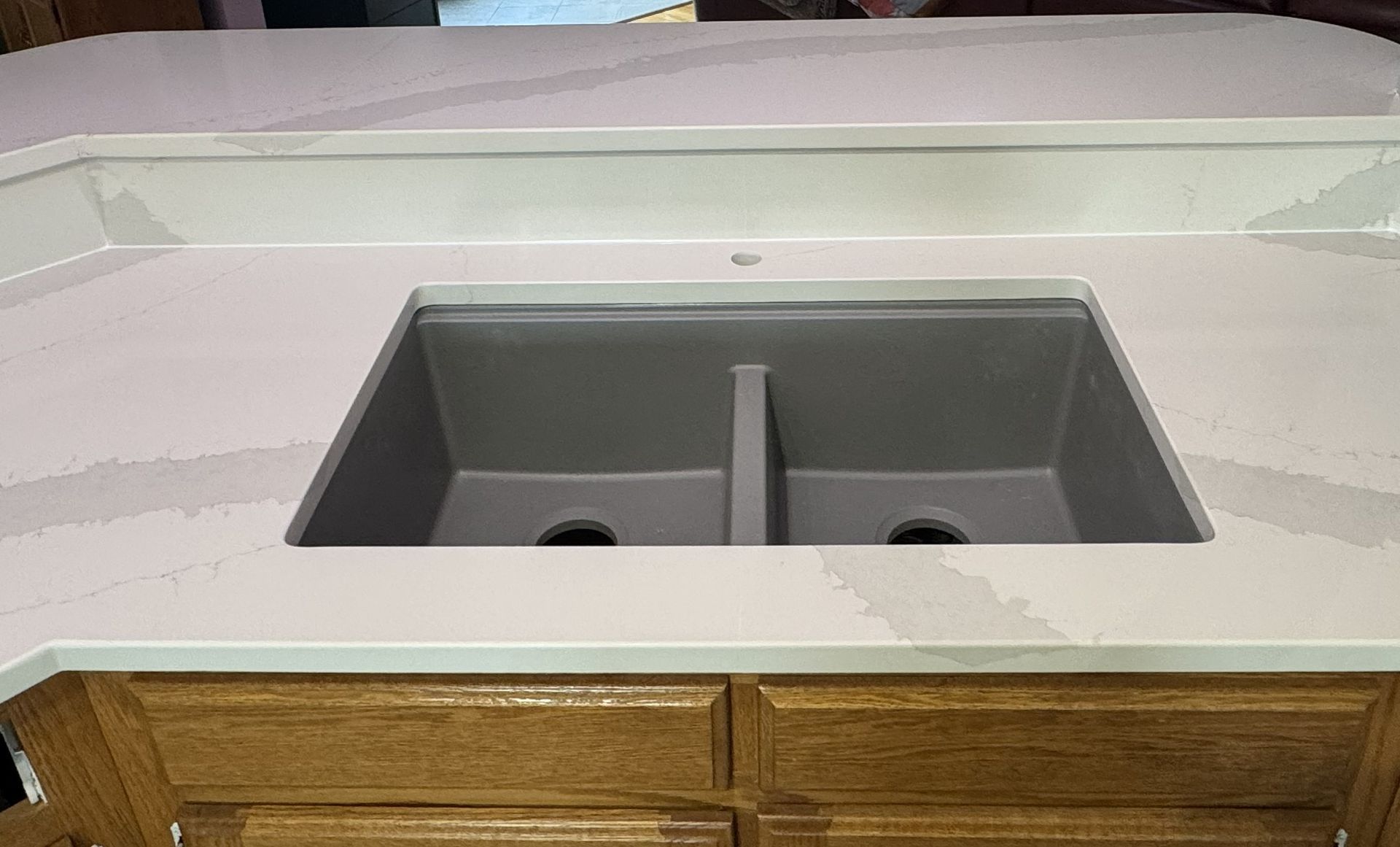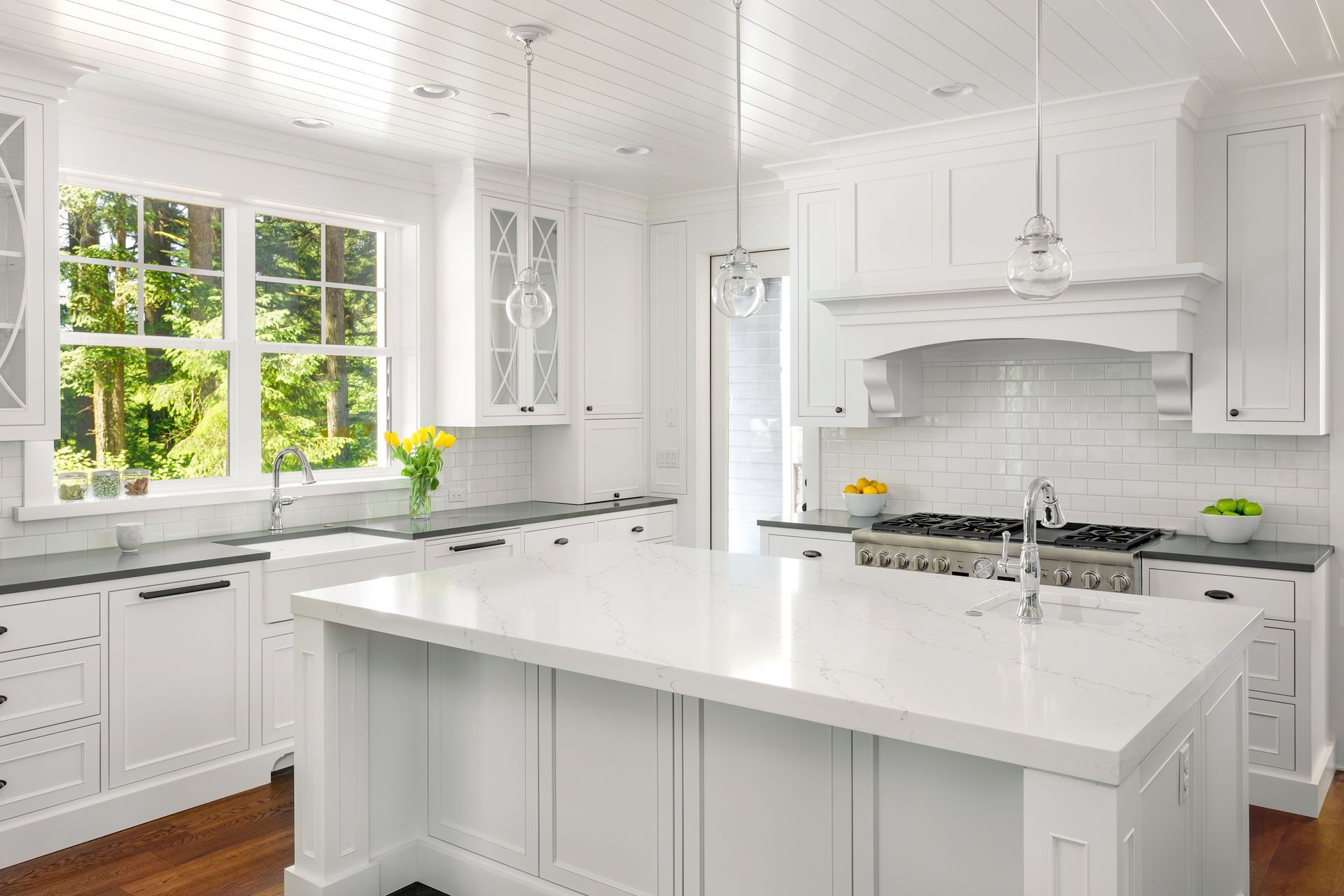Quartz Care and Maintenance
March 21, 2025
Quartz Countertops Care and Maintenance: How to Keep Your Surfaces Looking Their Best

Quartz countertops are one of the most popular choices for modern kitchens and bathrooms, and for good reason. Engineered from natural quartz crystals mixed with resins and pigments, they offer a durable, low-maintenance alternative to granite, marble, and other natural stone surfaces. With a non-porous surface, quartz is resistant to stains, bacteria, and scratching, making it an excellent choice for busy households.
However, while quartz countertops are more forgiving than many other materials, they still require some care to keep them looking their best. In this post, we’ll guide you through essential tips for quartz countertop maintenance and cleaning to ensure that your surfaces stay beautiful and functional for years to come.
1. Cleaning Your Quartz Countertops
One of the key benefits of quartz is that it’s non-porous, meaning liquids, stains, and bacteria won’t seep into the surface. This makes cleaning quick and easy.
How to clean quartz countertops:
- Daily Cleaning: Use a mild dish soap and warm water solution to wipe down the countertop with a soft cloth or sponge. A gentle microfiber cloth works best to avoid scratching the surface.
- Tougher Cleaning Jobs: For tougher stains or sticky residue, use a gentle all-purpose cleaner or a specially formulated quartz cleaner. Avoid cleaners that contain bleach, ammonia, or other harsh chemicals, as these can break down the resin and damage the countertop.
- Wipe Up Spills Promptly: While quartz is stain-resistant, it’s still a good idea to clean up spills as soon as they happen. Liquids such as coffee, wine, or juice can leave marks if left sitting for extended periods.
2. Avoiding Heat Damage
Unlike granite, quartz countertops are not as heat-resistant. Extreme temperatures can damage the surface, causing discoloration, cracks, or the resin to degrade.
Tips to avoid heat damage:
- Use Trivets and Hot Pads: Always place hot pans, pots, or baking sheets on trivets or hot pads instead of directly on the quartz surface.
- Avoid Direct Contact with High Heat: Don’t place hot cookware (e.g., a frying pan or roasting pan) on your quartz countertop straight from the stove or oven. Sudden temperature changes could cause the countertop to crack or discolor.
3. Preventing Scratches
Quartz is quite durable, but it’s still important to take care to prevent scratches that could diminish the appearance of your countertop.
How to prevent scratches:
- Use Cutting Boards: Always use a cutting board when chopping, slicing, or dicing. While quartz is harder than granite, it can still be scratched by sharp knives.
- Avoid Rough or Abrasive Tools: Do not use steel wool or abrasive pads on the surface, as they can cause scratches and damage the smooth finish of your countertop.
- Be Cautious with Heavy Objects: Heavy pots, pans, or other objects can leave marks if dropped on the quartz surface. Be mindful when handling items on the countertop.
4. Stain Removal on Quartz Countertops
Although quartz countertops are highly stain-resistant, certain substances—such as coffee, red wine, or food with high pigment content—can leave a mark if not cleaned quickly.
How to remove stains:
- Soap and Water: For most stains, cleaning with warm water and mild dish soap is usually sufficient.
- Use a Non-abrasive Cleaner: For more stubborn stains, a non-abrasive cleaner or a mild degreaser can help break down the stain.
- For Dried-on or Sticky Substances: Use a plastic scraper to gently lift off any dried food or sticky residue. Be sure not to use metal scrapers, as they may scratch the surface.
- Baking Soda Paste: For deeper stains, you can create a paste using baking soda and water. Apply the paste to the stain, let it sit for 10-15 minutes, and then wipe it away with a damp cloth.
5. Polishing Quartz Countertops
Unlike granite or marble, quartz doesn’t require regular polishing or sealing, as it naturally has a glossy finish. However, if you’d like to enhance the shine or restore some luster, a quartz-specific polish can be used.
How to polish quartz:
- Use a Quartz-Specific Polish: When you want to restore the shine, use a non-abrasive quartz polish that’s specifically designed for engineered stone surfaces.
- Buff Gently: Apply the polish with a soft microfiber cloth in small sections, buffing in circular motions to bring out the surface’s natural luster.
6. Handling Chips and Cracks
While quartz is highly durable, it’s not completely indestructible. If a heavy object is dropped or a sharp impact occurs, chips or cracks may form.
What to do if you notice chips or cracks:
- Small Chips: For minor chips, a professional repair specialist may be able to use resin fillers to fix the damage and restore the surface’s appearance.
- Larger Cracks: For larger cracks or damages, it’s best to contact a professional who specializes in quartz countertop repairs or replacement. In some cases, the damaged section might need to be replaced entirely.
7. Avoiding Staining from Oils and Grease
While quartz is resistant to most types of stains, oils and grease can sometimes leave marks if left on the surface for an extended period. It’s best to wipe up oils, butter, or greasy foods promptly.
How to avoid staining from oils:
- Quick Clean-Up: Wipe away oils or greasy substances right after use. A simple cloth or paper towel will usually do the trick.
- Use a Coaster or Tray: For items that contain oils (like a bottle of olive oil or greasy takeout), consider using a coaster or tray to catch any accidental spills.
8. Regular Inspections
Finally, it’s always a good idea to inspect your quartz countertops regularly for any signs of damage. Although quartz is low-maintenance, checking for any visible cracks, chips, or stains can help catch issues early before they become more significant problems.
Conclusion
Quartz countertops are a beautiful, functional addition to any home, and with the right care, they can maintain their stunning appearance for years. By cleaning regularly, protecting against heat and scratches, and taking care of stains promptly, you can enjoy the beauty and practicality of your quartz surfaces without the need for excessive maintenance.
Remember, quartz is a durable and low-maintenance material, but a little effort will go a long way in keeping it looking its best. By following these simple care tips, your quartz countertops will continue to shine and add value to your home for many years to come.


Marble has long been admired for its beauty, making it a popular choice for countertops and vanities in both kitchens and bathrooms. From its timeless appeal to its unique patterns, marble adds an elegant touch to any space. But have you ever wondered how this stunning stone forms? Let’s explore the geological journey of marble and its role in creating beautiful surfaces. What is Marble? Marble is a metamorphic rock that forms when limestone undergoes a transformation process under heat and pressure deep within the Earth’s crust. Over millions of years, this change alters the composition of limestone, resulting in a denser, crystalline stone with unique patterns and colors. The final product, marble, is often celebrated for its aesthetic qualities, making it a preferred material for interior design, especially in kitchens and bathrooms. The Journey from Limestone to Marble The Precursor: Limestone Marble begins as limestone, a sedimentary rock primarily composed of calcium carbonate (CaCO₃). Over millions of years, limestone forms from the accumulation of marine organisms, like shells and corals, as well as from the precipitation of minerals from water. While limestone itself is beautiful, it is softer and more porous compared to marble. Heat and Pressure: The Metamorphic Transformation As limestone is buried deep within the Earth due to tectonic plate movements, it is subjected to high pressure and temperature. These conditions cause the calcium carbonate crystals in the limestone to recrystallize. The result is marble—denser and more compact than its limestone predecessor. The stone’s texture and structure are transformed, creating the unique crystalline appearance that marble is known for. The Role of Impurities One of the defining features of marble is its distinctive veining and color variations. These patterns are a result of impurities in the original limestone. As the limestone undergoes metamorphism, minerals such as iron, clay, and sand mix with the calcium carbonate, creating different colors and patterns. For example, the presence of iron may give the marble a reddish or brownish hue, while other minerals can contribute shades of gray, green, or black veining throughout the stone. Time and Earth's Forces Over millions of years, geological processes like tectonic shifts and erosion can bring marble closer to the Earth’s surface. Once exposed, it can be mined and processed into slabs, tiles, and other shapes to be used in various applications, including countertops and vanities. The marble’s natural beauty, shaped by its long journey, becomes a defining feature of any space. Why Marble is a Popular Choice for Countertops and Vanities Aesthetic Appeal Marble’s most striking feature is its unique appearance. Each piece of marble has its own distinct veining, color, and pattern, making it a highly sought-after material for countertops and vanities. Whether it’s the classic white of Carrara marble or the dramatic veining of dark-colored varieties, marble adds elegance and sophistication to any room. Timeless Elegance Marble has a long history, having been used in ancient architecture, sculptures, and monuments. Its timeless elegance makes it a perfect addition to both modern and traditional home designs. Whether you’re creating a sleek, contemporary kitchen or a luxurious, classic bathroom, marble complements a wide variety of styles. Variety of Options One of the benefits of marble is its wide range of color and pattern variations. From soft, neutral tones to bold, dramatic veins, there is a marble variety to suit any taste. Popular marble varieties for countertops include Carrara, Calacatta, Statuario, and Emperador, each with its unique characteristics and beauty. Conclusion The formation of marble is a fascinating natural process that takes millions of years, from the transformation of limestone under heat and pressure to the final crystallization that gives the stone its iconic look. Whether you’re using it in a countertop, vanity, or other design element, marble’s beauty, with its one-of-a-kind patterns and colors, will continue to be a favorite in interior design. With proper care, marble surfaces can last for many years, providing timeless elegance to any space.




Share On: